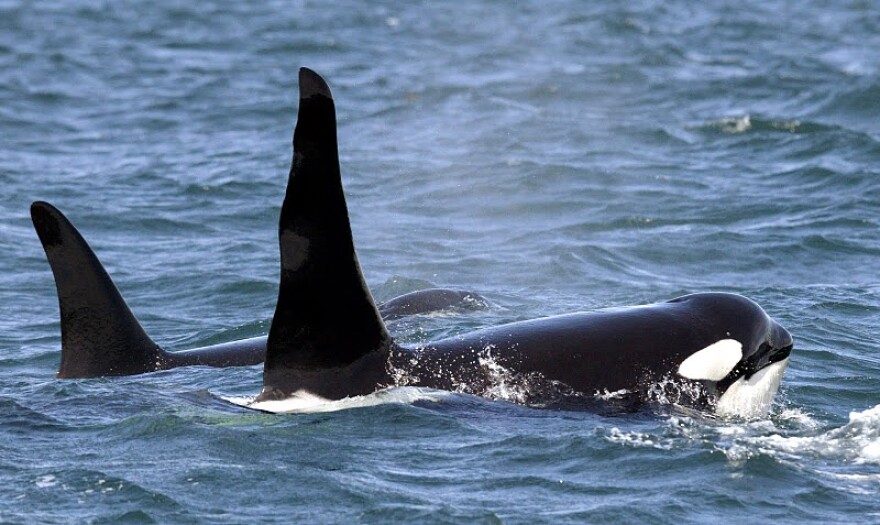People who love Puget Sound orcas and want to save them from extinction will rally in Olympia tomorrow. And Gov. Jay Inslee plans to join them, immediately after announcing his budget priorities for the coming year.
Many are wondering how Inslee’s budget will respond to the 36 recommendations proposed by the Orca Recovery Task Force, a group consisting of nearly 50 stakeholders who were convened by the governor in May. When Inslee addresses the crowd Thursday, it will be one of the first opportunities for task force members to hear feedback on their proposal.
"I'm jazzed, frankly, that we know the governor is making this a priority," said Mindy Roberts, the Puget Sound director for Washington Environmental Council. "It's really gratifying to see the plight of the orcas is really near the top of his list."
Roberts, a member of the task force, noted that "healthy tension" among fellow members led to debate over how extensive the list of action items should be. She says that while the lengthy proposal would be costly, the items are aimed at providing an honest representation of what is actually needed for orca recovery and survival.
“That said, I understand that there are certain priorities that need to be put forward,” Roberts said. “And we’re anxious to hear what the governor will be focusing in on – and then also working with our legislators in 2019, to turn those into actions.”
The environmental community Roberts represents is looking for substantive action in all three threat areas the task force focused on, she said. Among the items at the top of the priority list: restoring the Chinook salmon that orcas prefer to eat.
More Chinook are needed on a year-round basis. Some scientists have said removing dams on the lower Snake River would provide immediate and permanent restoration of Chinook access to 5,000 miles of upstream habitat. They argued their case in a letter sent to Inslee back in October.
Other action items top of mind include reducing the noise and disturbance from vessels near the whales, as well as cleaning up and reducing toxics that pollute orca and Chinook habitat. One task force member estimates the group's recommendations would cost anywhere from $60 million to more than a billion dollars.
There are currently 74 Southern Residents left across three pods in the Salish Sea, the lowest number in decades. The total took a hit after three orcas died over the summer, including the calf of J-35, who carried the deceased offspring with her for weeks as the world watched in grief. The pods haven’t seen a successful pregnancy in three years.
Roberts is hopeful that the crisis from the summer will finally get things done to avoid extinction of the Southern Resident population.
"I think that's what the public wants right now," she said. "We're hearing more people than ever asking questions about the health of Puget Sound, based on their concern over the poor health of orcas. And I think people are realizing really what's at stake."
UPDATE, Dec. 13 at 10:50 a.m.: Included in Inslee's proposal to increase state spending by $10 billion over the next two years is a call for $1 billion for orca recovery and improving water quality. The governor released his plan at a news conference Thursday morning, ahead of the orca rally where he was scheduled to speak. Olympia correspondent Austin Jenkins has more on the budget proposal.
We are making an unprecedented $1.1 billion investment to save our Southern Resident orcas. We are increasing habitat and water for salmon, reducing disturbance from vessels and working to remove toxic pollution from the water.
— Governor Jay Inslee (@GovInslee) December 13, 2018
UPDATE, Dec. 13 at 11:20 a.m.: The governor's office released a lengthy post following the budget announcement Thursday, underscoring the "dismal fate" facing orcas and salmon in the Puget Sound.
"Without taking bold actions and drastically changing human impact to our environment, these animals may not survive," the post reads. "Besides helping orcas, these investments will have significant benefits for the region’s entire ecosystem and complement efforts to recover salmon, tackle climate change, improve water quality and more."
In the release published to Medium.com, Inslee punctuated the $1.1 billion proposal calling for increased funds for orca recovery and water-quality improvements.
"We are undertaking a herculean effort to save these iconic creatures," he said. "It will take action at every level of the environment across our entire state. We need to restore the ecosystem to one that sustains orcas, salmon and the quality of life for all Washingtonians.”
Response from ranking Republican on Senate budget Cmte to @GovInslee budget proposal. #waleg pic.twitter.com/bwCVRQW0tQ
— Austin Jenkins N3 (@AustinJenkinsN3) December 13, 2018
UPDATE, Dec. 13 at 5:20 p.m.: Inslee embraced the recommendations from the orca task force he convened earlier this year. His proposal for orca recovery led the news conference. Inslee valued it at $1.1 billion dollars, but included some items (such as electrifying state ferries) that he also counted in the clean energy package he unveiled on Monday.
"Our Washington state orcas are being pushed to the edge of eternal silence," he said at the briefing. "And Washington state will not allow them to be pushed over the edge."
The details of the plan mirror the task force recommendations that preceded it, with a major emphasis on boosting the population of Chinook salmon. He wants to spend hundreds of millions of dollars to remove barriers to fish passage, increase hatchery capacity and restore habitat.
"When we save the orcas from toxins, when we save the orcas from climate change, when we save them from pollution, we save ourselves," Inslee said.
State Republicans called Inslee's overall spending plan unsustainable. Listen to this story from environment reporter Bellamy Pailthorp below.
His proposal for orca recovery led the news conference. Inslee valued it at $1.1 billion dollars, but included some items (such as electrifying state ferries) that he also counted in the clean energy package he unveiled on Monday.








